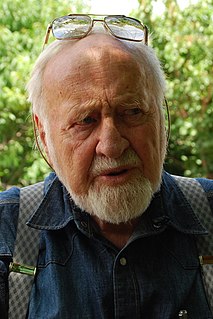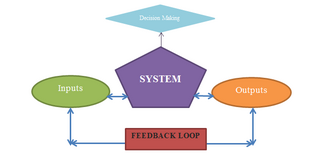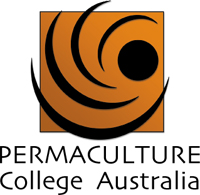
An ecovillage is a traditional or intentional community with the goal of becoming more socially, culturally, economically, and/or ecologically sustainable. An ecovillage strives to produce the least possible negative impact on the natural environment through intentional physical design and resident behavior choices. It is consciously designed through locally owned, participatory processes to regenerate and restore its social and natural environments. Most range from a population of 50 to 250 individuals, although some are smaller, and traditional ecovillages are often much larger. Larger ecovillages often exist as networks of smaller sub-communities. Some ecovillages have grown through like-minded individuals, families, or other small groups—who are not members, at least at the outset—settling on the ecovillage's periphery and participating de facto in the community.

Permaculture is an approach to land management and settlement design that adopts arrangements observed in flourishing natural ecosystems. It includes a set of design principles derived using whole-systems thinking. It applies these principles in fields such as regenerative agriculture, town planning, rewilding, and community resilience. Permaculture originally came from "permanent agriculture", but was later adjusted to mean "permanent culture", incorporating social aspects. The term was coined in 1978 by Bill Mollison and David Holmgren, who formulated the concept in opposition to Western industrialized methods and in congruence with Indigenous or traditional knowledge.

Bruce Charles "Bill" Mollison was an Australian researcher, author, scientist, teacher and biologist. In 1981, he was awarded the Right Livelihood Award "for developing and promoting the theory and practice of permaculture".
David Holmgren is an Australian environmental designer, ecological educator and writer. He is best known as one of the co-originators of the permaculture concept with Bill Mollison.

Nimbin is a village in the Northern Rivers area of the Australian state of New South Wales, approximately 30 km (19 mi) north of Lismore, 33 km (21 mi) northeast of Kyogle, and 70 km (43 mi) west of Byron Bay.
CERES Community Environment Park is a 4.5-hectare (11-acre) environmental education centre and social enterprise located in urban Brunswick East, Victoria, Australia. CERES stands for Centre for Education and Research in Environmental Strategies. The name also connects with Ceres the goddess of agriculture in Roman mythology.
TAFE NSW is an Australian vocational education and training provider. Annually, the network trains over 500,000 students in campus, workplace, online, or distance education methods of education. It was established as an independent statutory body under the TAFE Commission Act 1990. The Minister for Regional Development, Skills and Small Business is responsible for TAFE NSW.

Geoff Lawton is a British-born Australian permaculture consultant, designer, teacher and speaker. Since 1995 he has specialised in permaculture education, design, implementation, system establishment, administration and community development.

Nash Timbers is a global and domestic distributor of timber flooring, joinery, and beams.

Regenerative design is a process-oriented whole systems approach to design. The term "regenerative" describes processes that restore, renew or revitalize their own sources of energy and materials. Regenerative design uses whole systems thinking to create resilient and equitable systems that integrate the needs of society with the integrity of nature.
Ecological design or ecodesign is an approach to designing products and services that gives special consideration to the environmental impacts of a product over its entire lifecycle. Sim Van der Ryn and Stuart Cowan define it as "any form of design that minimizes environmentally destructive impacts by integrating itself with living processes." Ecological design can also be defined as the process of integrating environmental considerations into design and development with the aim of reducing environmental impacts of products through their life cycle.
An eco hotel, or a green hotel, is an environmentally sustainable hotel or accommodation that has made important environmental improvements to its structure in order to minimize its impact on the natural environment. The basic definition of an eco-friendly hotel is an environmentally responsible lodging that follows the practices of green living. These hotels have to be certified green by an independent third-party or by the state they are located in. Traditionally, these hotels were mostly presented as ecolodges because of their location, often in jungles, and their design inspired by the use of traditional building methods applied by skilled local craftsmen in areas, such as Costa Rica and Indonesia.
Robyn Mary Parker, is a former Australian politician, was a member of the New South Wales Legislative Assembly representing Maitland for the Liberal Party from 2011 to 2015 and was previously a member of the Legislative Council of New South Wales between 2003 and 2011. Parker was the New South Wales Minister for the Environment and the Minister for Heritage in the O'Farrell government from 2011 until April 2014. Parker was succeeded by Rob Stokes in the Baird cabinet.

Green buildings in Australia are assessed and rated by a variety of government and independent ratings systems.

Permaculture College Australia Inc is a not-for-profit sustainability training organisation which conducts the accredited vocational training and community education programs in permaculture at Djanbung Gardens in Nimbin, New South Wales.
Sustainable Organic Integrated Livelihoods or SOIL is an American nonprofit developmental aid organization co-founded by Sasha Kramer and Sarah Brownell in 2006. Its goal is to develop integrated approaches to the problems of poverty, poor public health, agricultural productivity, and environmental destruction in Haiti. SOIL's efforts have focused on the community-identified priority of increasing access to ecological sanitation, where human wastes are converted into compost. More than 20,000 Haitians are currently using SOIL ecological sanitation toilets.
Low-impact development (LID) has been defined as "development which through its low negative environmental impact either enhances or does not significantly diminish environmental quality".
A Bachelor of Environmental Design, (B.EnvD.), is an undergraduate course of study. Similar in nature to a pre-law degree, a B.EnvD is designed as preparatory undergraduate training for a professional course of study in architecture, landscape architecture, or urban planning, and is one of several degrees offered as preparatory training for the Master of Architecture degree. An alternative three-year Master of Architecture exists for people with a bachelor's degree not related to design, the M.Arch I degree. A Bachelor of Environmental Design should not be confused with a Bachelor in Environmental Studies, which though similar, does not train one for graduate professional study in architecture, landscape design, or urban planning. Environmental Design degree programs generally take four years of full-time study to complete, and many institutions allow a specialty emphasis within urban planning, architecture or landscape architecture. Other pre-professional degrees include the B.S. in Architectural Studies, B.A. in Architecture, the B.S. in Architecture, and the B.S. in Construction Management. Though the Bachelor of Environmental Design is not accredited by the National Architectural Accrediting Board NAAB, like other college degrees, programs in Environmental Design are accredited through their host-institution schools by various regional agencies, such as the Middle States Association of Colleges and Schools, or the North Central Association of Colleges and Schools. The Bachelor of Environmental Design should not be confused with the M.Arch or the five-year accredited B.Arch degree.

Michael Mobbs is a Sydney-based author and environmental consultant. He graduated from the Australian National University with a Bachelor of Laws in 1975 and then worked as an environmental lawyer for 19 years. Through this work he developed an interest in sustainability. Mobbs served as an Independent Alderman on the City of Sydney Council from 1985 to 1987. In the 1990s Mobbs converted his Chippendale home into a more sustainable house by modifying the water, energy and waste systems. He regularly opens his house for guided public tours.










